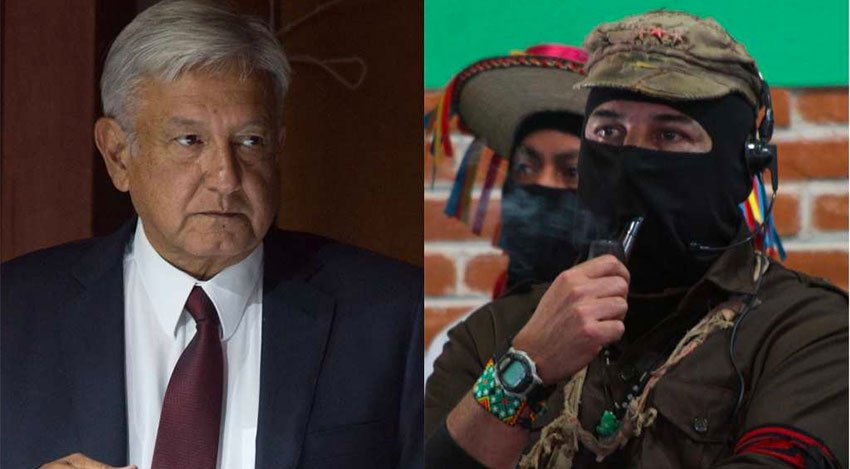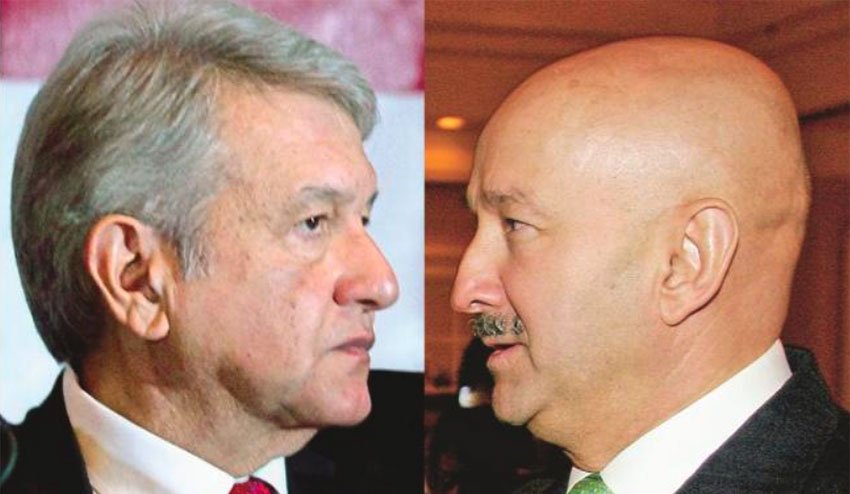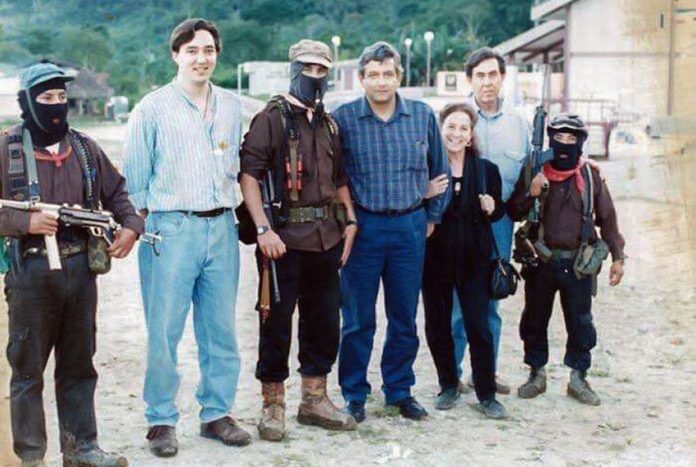President López Obrador expressed his respect for the Zapatista Army of National Liberation (EZLN) during a visit to Chiapas over the weekend but the possibility of its indigenous Mayan members heeding his call for unity would appear unlikely judging by the two parties’ fractious past.
López Obrador said on Saturday that the government “very much respects the Zapatista movement,” adding that his “fraternal and respectful recommendation is for us not to fight.”
“Enough division already, all of us need to unite,” he said before reciting lyrics from the Chiapas state anthem that call for an end to “hateful vengeance” and for everyone to come together as brothers.
The president yesterday posted a 1994 photo to his social media accounts which shows him posing alongside former EZLN leader Subcomandante Marcos, other members of the rebel army and former presidential hopefuls Cuauhtémoc Cárdenas and Rosario Ibarra de Piedra.
“. . . On that occasion, the issue was to achieve peace. I only remember that a picture is worth a thousand words,” López Obrador wrote above the photo, which was published on his Facebook, Instagram and Twitter accounts.
On January 1, 1994 – the same day that the North American Free Trade Agreement, or NAFTA, took effect – the EZLN launched a military offensive in Chiapas after issuing a declaration stating that the Mexican government was illegitimate.
The rebel force seized several towns in the southern state but the Mexican army retaliated on January 2 and inflicted heavy casualties on the guerrillas, forcing them to retreat.
Fast forward a quarter of a century and the EZLN remains opposed to the federal government, most notably speaking out against its plan to build the Maya Train on the Yucatán peninsula.
On January 1, army chief Subcomandante Moises said that the EZLN would oppose projects proposed by the López Obrador administration including the ambitious rail project and the National Guard.
“We are going to fight. We are going to confront [them]; we are not going to allow [López Obrador] to come through here with his destructive projects,” he said just before midnight on New Year’s Eve at a ceremony marking the 25th anniversary of the 1994 uprising.
That the EZLN opposes López Obrador should come as no surprise – it has been critical of the political veteran for more than a decade, although both are considered to be well to the left on the political spectrum.

During the lead-up to the 2006 presidential election, the Zapatistas made it clear that they wouldn’t be supporting the Democratic Revolutionary Party (PRD) candidate, who ended up narrowly losing the vote to National Action Party contender Felipe Calderón.
Instead, they called for voters to abstain from voting, a move that some commentators said only helped López Obrador’s opponents.
In a 2005 manifesto entitled La (Imposible) ¿Geometría? del Poder en México (The (Impossible) Geometry? Of Power in Mexico), Subcomandante Marcos asserted that López Obrador’s plans for the country were not leftist but rather centrist, “and the center [of politics] is nothing more than the moderate right.”
He also likened López Obrador to former Institutional Revolutionary Party (PRI) president Carlos Salinas de Gortari – widely considered one of Mexico’s most corrupt presidents – by writing that the image “constructed” by López Obrador of the latter “is, in reality, a mirror.”
It is worth noting that to this day, López Obrador continues to rail against Salinas, describing him as one of the most prominent leaders of the “mafia of power,” the president’s preferred term for describing corrupt politicians.
The president has long accused the ex- president of involvement in the alleged electoral fraud that he claims resulted in him losing the 2006 election to Calderón.
Days after the election, Subcomandante Marcos said that he agreed with López Obrador’s claim that fraud had cost him the election but denied that the lack of support from the EZLN had anything to do with the defeat.
In the lead-up to the 2012 election, in which López Obrador once again stood as a candidate for the PRD, the second-time presidential hopeful appealed to the EZLN to rethink its position.
“I ask you to freely reflect, to not make again the mistake of 2006, of discrediting [us], because without aiming to, by discrediting us and saying we were the same as the others, you helped the right,” he said.
The strategy didn’t work. Days later, Subcomandante Marcos surfaced and said that López Obrador hadn’t “matured or recognized his mistakes” from the past.
He also said that the ostensibly leftist leader’s ambitions were predicated on love, not for the people of Mexico, but rather “for the right” wing of politics.
Needless to say, the EZLN didn’t endorse López Obrador’s candidacy and PRI candidate Enrique Peña Nieto comfortably prevailed.

It was a case of third time lucky for the Tabasco native at last year’s election, which he won in a landslide representing a new party that he founded, the National Regeneration Movement, or Morena.
But once again the EZLN declined to back López Obrador even though his leftist rhetoric appeared to be, at least in part, congruent with the rebels’ ideology.
Instead, the EZLN declared its support for indigenous candidate María de Jesús Patricio Martínez, a Nahua woman affectionately known as Marichuy.
She ultimately failed to attract enough signatures to appear on the ballot but even so, the National Indigenous Council, an organization with close links to the EZLN, refused to endorse López Obrador.
Shortly after his victory, the Zapatistas said in a statement that the new government would only disappoint, asserting that the “foreman” might have changed but the “farmer will continue to be the same” – in other words, forgotten.
Now, a week after López Obrador celebrated the first anniversary of his election victory and just over seven months into his six-year term, there has been no indication that the EZLN is prepared to let bygones be bygones and support the maximum authority of the Mexican government, which for so long it has opposed.
Source: Nación 321 (sp), El Universal (sp), El Financiero (sp)
